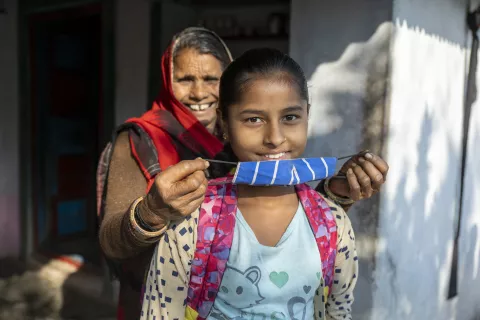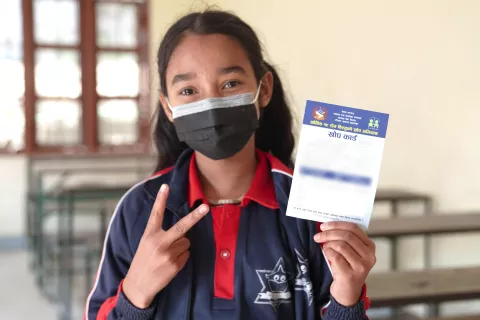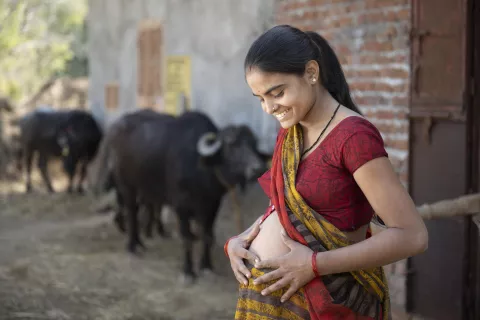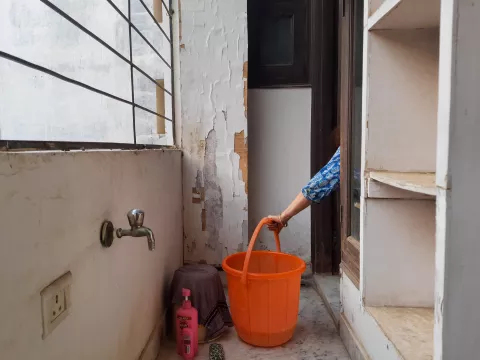What to do before, during and after getting vaccinated for COVID-19
Tips from Health Experts

Getting vaccinated is a massive moment for you, your family, community and the world. But it can also be stressful.
It can be useful to remember that by getting vaccinated you are not only protecting yourself from COVID-19, but also your loved ones around you.
We spoke to Health Experts from UNICEF in South Asia for their top tips on what to do before, during and after getting vaccinated for COVID-19 in South Asia.
Before vaccination
Do your research
- Learn more about the different types of COVID-19 vaccines and how they work and how vaccinations are being rolled out in South Asia.
- Make sure you’re relying on accurate vaccine information by checking that it comes from a trustworthy source, like your Ministry of Health, WHO or UNICEF.
- Cross-check vaccine information that you find online, particularly if it comes from unknown sources.
- If you have any doubts, talk to staff at your nearest Health Facility, or a health worker.
Prepare your things
Make sure you have:
- A mask that covers your nose and mouth - and fits tightly and comfortably. More guidance on masks here.
- Hand sanitizer.
- The notification you received about your appointment.
- Your ID (as appropriate for your country).
- A travel plan, to get to your appointment on time.
Wear loose or short sleeves that can be rolled up easily, so that health workers have easy access to your arm.
Tell your health provider, or vaccinator, if you have any health issues or are taking any medications, including any pain killers.
Cancel your appointment if you have COVID-19 or the symptoms
If you have COVID-19, or the symptoms, on the day of your vaccination appointment, do not go to the appointment. This is because you could spread the virus to others at the vaccination centre.
Get in touch with your vaccination centre, by message, phone or email to let them know you will not be attending your appointment because you have COVID-19 symptoms.
You can get vaccinated when it has been 14 days since you last experienced COVID-19 symptoms.
At the vaccination centre
When waiting in line outside of the vaccination centre, and once you are inside:
- Keep your mask on at all times.
- Don't touch your mask once it's on and properly fitted.
- Keep at least 1 metre distance between yourself and others.
- Sanitize or wash your hands after touching door handles, surfaces or furniture.
- Don’t touch your face.
During vaccination
All COVID-19 vaccines, regardless of the manufacturer, are administered in the same way. The vaccine will be injected into the muscle in your upper arm. It should take no longer than a few seconds and may cause a little pain.
Keep your mask on during your appointment and turn your face away from the face of the vaccinator — to help keep you both safe.
If you are feeling nervous or anxious:
- Remember that it is just a small prick that could save your life.
- Take slow deep breaths.
- Look away from the needle.
After vaccination
Expect minor side effects
After being vaccinated, some side effects are normal and expected. Side effects are a sign that your body is building immune protection.
Common side effects observed with COVID-19 vaccines include:
- Some pain, swelling and redness on the arm where you received the vaccine
- Chills or mild fever
- Tiredness
- Headaches
- Joint pain or muscle ache
These side effects typically go away within a few days.
Stay at the vaccination centre for the observation period
After being vaccinated you’ll need to stay in an observation area for 15-30 minutes.
This is to monitor your reaction to the vaccine and make sure you don’t experience any severe side effects.
Severe side effects are very rare, but could include:
- Itching
- Fainting
- Vomiting
- Severe allergic reaction
- Wheezing, difficulties in breathing or shortness of breath.
Let a health worker know immediately if you experience any of these side effects.
Severe side effects, while very rare, are most likely to appear in the first 30 minutes after being vaccinated. Your stay in the observation area means qualified help is on hand in the unlikely event that you do experience any.
Prepare for your second vaccination appointment
Most COVID-19 vaccines need two doses to work. This means you need to be vaccinated twice — with a gap of 4-12 weeks between the first and second dose.
Before you leave your first vaccination appointment, make sure you know whether the vaccine you had is one or two doses – and if it is two doses, that you know the date of your second appointment (or the plan for scheduling it).
If your vaccine is two doses, it’s important that you get your second dose, even if you experienced side effects from the first — unless a vaccination provider, or your doctor, tells you not to get the second dose.
You’ll likely also need a booster (third) dose 4-6 months later. Speak to a health worker for more information.
When you get home
Take care of yourself
If you experience side effects, these may affect your ability to do daily activities for a few days.
Some people may develop fever, muscle pain and swelling, redness, pain or a tingling sensation at the site of injection, for 1-2 days. Make sure you’re drinking plenty of fluids.
You can take some paracetamol to help ease any of these sensations. If you do, make sure you follow the dosage instructions from the pharmacist or provider.
If your symptoms are more severe, or last longer than a week, tell the health workers who gave you the vaccine.
Care for the arm where your vaccine was injected
You can reduce any pain or discomfort in the arm where you got the vaccine, by applying a cool, clean, wet washcloth over the area.
Put your second vaccination appointment in your calendar
As mentioned, most COVID-19 vaccines require two doses to work. It takes time for your body to build protection. If the vaccine you’re having is a two dose one, you may not be protected from the virus until two weeks after your second vaccination.
For two dose vaccines, it can be several weeks or more between your first and second vaccinations — so it’s important that you don’t forget the appointment!
Put the date of your second vaccination appointment in your calendar and keep your appointment information in a safe place.
Keep up preventive behaviours
It’s important that you continue to follow preventive measures after being vaccinated. This is because COVID-19 vaccines have proven effective at stopping people developing the virus, but we don't yet know whether they prevent people from passing infection onto others.
Continue to protect yourself and others by:
- Washing your hands with soap and water for a minimum of 20 seconds, or hand sanitizer — as often as you can.
- Keeping at least 1 metre distance between yourself and others.
- Meeting people in well ventilated, or outdoor spaces
- Wearing a mask when you can’t keep your distance from others, or are inside a public space.
This is especially important until two weeks after your second vaccination - as during this period, your body is still building protection against the virus.
Share & Celebrate
Being vaccinated is a huge moment and a huge relief — Enjoy!
Talk to others about your experiences
Encourage others to get vaccinated and talk about the process and how it made you feel.
Join UNICEF’s ✌ for #Vaccinated campaign
📸 Take a photo holding up a v-sign.
🤳 Share it to social media, with your feelings about your vaccination.
✌ Use the hashtag #Vaccinated and tag @UNICEFSouthAsia for the chance to be featured.
Prepare for a booster dose
After you’ve been fully vaccinated, it’s highly recommended that you get a booster dose (third dose) 4-6 months after your second dose.
Booster doses are especially important to help keep you safe if you are at a higher risk of getting severely ill from COVID-19. This includes health workers, those over the age of 65, people with additional health conditions (including high blood pressure, a heart condition and diabetes) and pregnant women.
The World Health Organization recommends a second booster (fourth) dose for high-risk groups – to build your protection and best keep you safe.
Speak to your health worker for more information.




